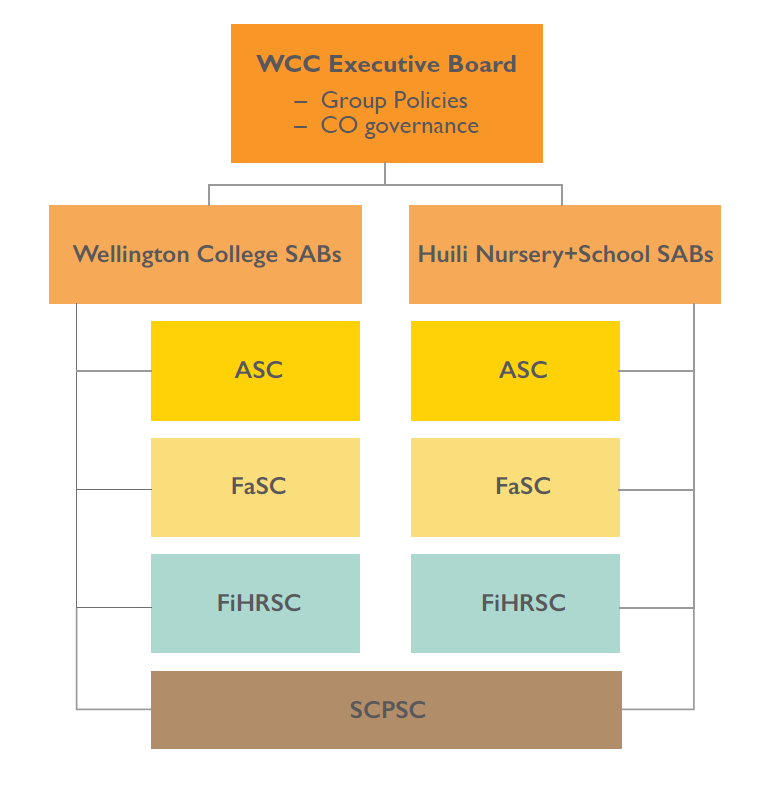At Wellington College China (WCC), we aspire to create a caring community that develops well-rounded individuals with strong values and the skills to thrive within an ever-changing world.
WCC aims to establish schools that, over time, can flourish with high levels of autonomy. Each WCC school enjoys significant levels of legal and financial independence with its own governing body, a School Affairs Board (SAB).
The schools, however, are not independent. They are under a single ownership and operate under a clearly defined common framework. All schools carry the same Wellington College China name and therefore share the same reputation. The Central Office is a shared group resource. The WCC Executive Board was established to make group-level decisions and govern the Central Office. The Executive Board has the power to mandate standardisation of policies, systems and services. It also approves the group-level targets shared by our senior leaders.
There are three levels in our governance structure: the WCC Executive Board, SABs and sub-committees. The WCC Executive Board has five members. Each SAB has five members as well.
SAB members are appointed by Wellington College International China Management (WCICM), a company owned by WCC’s founder and chairman, and Wellington College International (WCI), a subsidiary of Wellington College UK. The latter comprises no less than 34% of the voting membership. Huili SAB members are solely appointed by WCICM.
Each member of the WCC Executive Board, SABs and sub-committees (staff members and parent members are not included) is given the title of ‘Wellington College China Governor’. They meet twice a year, online or in person, in November/December and June to:
• Engage in training and development
• Evaluate the effectiveness of governance and plan for improvements
• Share group-level information and long-term development strategies.
However, such a gathering is for training and information sharing purposes and is not a decision-making forum.
There are four full-time governors: the chairman, the CEM and two international directors (ID), who are appointed by Wellington College UK. The chairman serves on all SABs. The CEM serves on the SABs of new schools. The ID serves on all Wellington SABs.
All other governors are non-executive unpaid governors and serve on one SAB only. The combination of paid full-time governors and unpaid non-executive governors provides a balance. The full-time governors have the depth of knowledge and overview of the group and are responsible for much of the governance administrative work, while the non-executive governors provide a broader range of expertise and ensure openness and transparency in our governance.
Many governance decisions are delegated by the SAB to the four sub-committees. They are: the Academic Sub-Committee (ASC), the Facilities and Services Sub-Committee (FaSC), the Finance and HR Sub-Committee (FiHRSC) and the Safeguarding and Child Protection Sub-Committee (SCPSC).

The aim of the SAB sub-committees is to provide a more detailed and practical level of governance to the school. They allow for deeper analysis and discussions and have delegated authority from their SABs to make certain decisions.
Sub-committees comprise SAB members, external non-executive experts, school leaders, employees who have undertaken the WCC High Potential Programme, CO representatives and parent members. This combination is intended to offer a balanced view. The SAB members attending the sub-committee shall decide if any item should be referred to the SAB.
Wellington College China governance undergoes an annual evaluation process to examine the effectiveness of its strategic leadership. This is done through self-assessment by all governors, collecting feedback from school leaders and working with external consultants to compare ourselves with and learn from the most effective school governance worldwide. The Executive Board works with experienced UK school governance and culture specialists to support the development of the current approach and provide ongoing training and support to all the governors. This continuous self-improvement process helps to keep the board professional and adaptable to each school's — and the group’s — growing needs.
